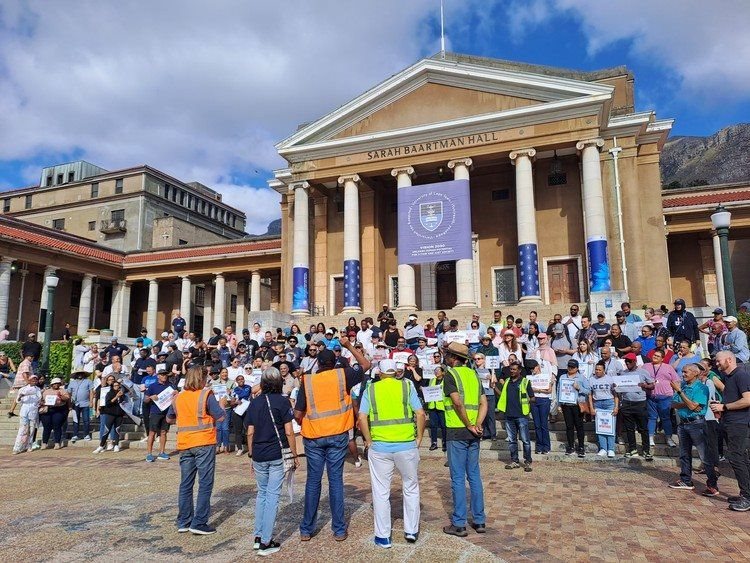They also want a unified bargaining forum.

Members of the University of Cape Town Employees Union gather on the plaza outside Sara Baartman Hall on the first day of a strike expected to last till the end of next week. Photo: Liezl Human
- Approximately 1,400 members of the UCT Employees Union went on strike on Thursday.
Among their demands are a 7.5% increase for 2024 and for the university to implement a unified bargaining forum.UCT interim vice-chancellor Daya Reddy accepted the protesting workers’ memorandum. He said management was optimistic an agreement would be reached soon.bout 150 members of the University of Cape Town Employees Union (UCTEU) marched through the university on Thursday, the first day of their strike.
UCTEU is the university’s largest union, representing professional, administrative and support service (Pass) employees. It has about 1,400 members across a wide range of salaries.
The union is calling for a further 1.5% increase for 2023, bringing the total increase for last year to 7.5%. It also wants a 7.5% increase for 2024, and immediate payment for performance awards for June 2022 to May 2023.
It wants the university to implement a unified bargaining forum. Among other demands, it wants concerns of bullying by academics to be addressed.
Union members gathered on the plaza outside Sarah Baartman Hall and then marched to Bremner Building, UCT’s administrative headquarters. There they picketed and held placards, some reading: “Underpaid & undervalued”, “Bargaining is not a tick box exercise”, and “UCT…Eish, eish, eish”.
Interim vice-chancellor Daya Reddy and other UCT officials received the union’s memorandum. Reddy addressed the employees and said that the university management would convene and get back to the union as soon as possible. “We will treat this as an urgent matter,” he said.
Union president Andrea Plos said, “We’re not a union that has demands that are way off the table.” She said they would be open to meeting the university management halfway.
In its strike notice, the union said that it had “exhausted all avenues of a non-strike resolution to our dispute and demands”.
Plos said the last time the union went on strike was in 2008. “It gives you an idea how often we will find a solution rather than go on strike,” she said.
PASS staff include technical and scientific officers, secretaries and administrative workers. “They are as integral to the university as academics. I would never say academics are not important. Every cog of the wheel makes this university work, including the Pass staff,” said Plos.
In a statement on 7 February, Reddy said, “While we would very much have wanted to conclude these engagements much earlier, negotiations by their very nature can continue for longer than anticipated as more complex issues are thoroughly considered by both parties in the interest of reaching an amicable agreement. The UCT management remains committed to working with the unions towards a speedy conclusion of the negotiations.”
He also said that the university is “already at an advanced stage with the negotiations for academic staff” and that the other Pass unions, National Education Health and Allied Workers Union (Nehawu) and Democratised Transport Logistics and Allied Workers Union (Detawu) have already signed the collective single bargaining agreement.
He said that the university is working to merge both the academic and Passbargaining units. “The UCT management is optimistic that the forthcoming negotiations will result in an agreement that takes into consideration the reality of the university’s current financial situation and the need for staff members to be remunerated appropriately,” said Reddy.
Published originally on GroundUp.



























